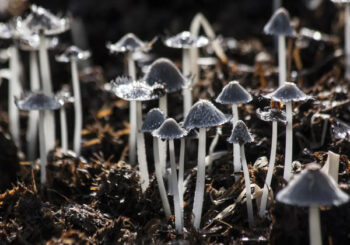By John Patterson
Staff Writer for Wake Up World
In a world where plastic pollution has become a pressing global concern, researchers at the University of Sydney have embarked on a journey that could forever alter the fate of one of the most stubborn plastic pollutants – polypropylene. This versatile yet notoriously hard-to-recycle plastic, found in a wide array of everyday items from food containers to fashion pieces, has long posed a challenge to recycling efforts.
Despite accounting for approximately 28 percent of the world’s plastic waste, a mere 1 percent of polypropylene is successfully recycled, leaving a staggering environmental footprint.
Fungi’s Unexpected Superpower
However, a glimmer of hope has emerged from the labs of the University of Sydney, where researchers have harnessed the unique abilities of fungi to tackle this plastic predicament. Aspergillus terreus and Engyodontium album, two common fungi found in soil and plants, have been revealed as plastic degraders. Through a groundbreaking experiment, these fungi demonstrated their prowess in breaking down polypropylene, marking a significant stride towards a more sustainable future.
Lead author Amira Farzana Samat, a PhD student at the University of Sydney’s School of Chemical and Biomolecular Engineering, emphasized the urgency of the plastic pollution crisis: “Polypropylene is a common plastic used to make a huge variety of everyday products…but it only has a recycling rate of only one percent, meaning it is overrepresented in plastic waste and pollution globally.”
Fungi to the Rescue
In their study published in npj: Materials Degradation, the researchers detailed how Aspergillus terreus and Engyodontium album were employed to biodegrade polypropylene in a controlled laboratory setting. The plastic was pre-treated with UV light or heat, enhancing the fungi’s ability to break it down. Over a span of 30 days, the fungi reduced the plastic by 21 percent, and over 90 days, the degradation rate reached an impressive 25-27 percent.
Fungi’s Remarkable Role in Plastic Degradation
“Fungi are incredibly versatile and are known to be able to break down pretty much all substrates,” explained Professor Dee Carter, an expert in mycology from the School of Life and Environmental Sciences and co-author of the study. Their powerful enzymes play a crucial role in breaking down complex materials into simpler molecules that can be absorbed by fungal cells. This natural superpower is what enables fungi to thrive on various man-made materials, transforming them into more manageable components.
Unveiling Nature’s Secrets for Plastic Degradation
The study also sheds light on the potential for natural degradation of plastic under specific conditions. Professor Ali Abbas, Chief Circular Engineer at Circular Australia and Mrs. Samat’s PhD supervisor, emphasized that despite the magnitude of plastic production and consumption, little attention has been paid to the degradation of plastics in environmental conditions. This breakthrough raises questions about the natural conditions that accelerate plastic degradation, sparking further investigations into the role of biological processes offered by fungi and other microorganisms.
Paving the Path Forward
As the world grapples with plastic pollution, Professor Abbas highlighted the need for innovative recycling technologies that harness biological processes. “Our study did not yet carry out any optimization of the experimental conditions, so there is plenty of room to further reduce this degradation time,” he noted. The researchers are dedicated to enhancing the efficiency of polypropylene degradation and are already exploring ways to improve the process using microorganisms from marine environments.
The Promise of Tomorrow
With their sights set on a sustainable future, the researchers are determined to scale up this groundbreaking technology. Not only has polypropylene degradation shown immense promise, but the team has also extended their efforts to tackle marine plastic waste, achieving even higher rates of degradation. As Ms. Samat exclaimed, “We are quite excited about this and have started looking at different ways to improve the degradation process using these microorganisms. Watch this space.”
In a world where plastic pollution seems insurmountable, the alliance between science and nature offers a glimmer of hope. The power of fungi to break down plastic opens doors to a more sustainable future, paving the way for a world where plastic pollution may finally meet its match.
Reference:
About the author:
John Patterson is an avid writer and researcher who delves into the latest scientific research. With an insatiable curiosity, he translates complex concepts into accessible narratives, allowing readers to embark on a journey of discovery. Through his work, John bridges the gap between experts and the public, igniting curiosity and inspiring meaningful conversations about scientific breakthroughs.

If you've ever found value in our articles, we'd greatly appreciate your support by purchasing Mindful Meditation Techniques for Kids - A Practical Guide for Adults to Empower Kids with the Gift of Inner Peace and Resilience for Life.
In the spirit of mindfulness, we encourage you to choose the paperback version. Delve into its pages away from screen glare and notifications, allowing yourself to fully immerse in the transformative practices within. The physical book enriches the learning process and serves as a tangible commitment to mindfulness, easily shared among family and friends.
Over the past few years, Wake Up World has faced significant online censorship, impacting our financial ability to stay online. Instead of soliciting donations, we're exploring win-win solutions with our readers to remain financially viable. Moving into book publishing, we hope to secure ongoing funds to continue our mission. With over 8,500 articles published in the past 13 years, we are committed to keeping our content free and accessible to everyone, without resorting to a paywall.









